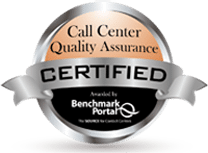The College of Call Center Excellence
Quality Assurance Certification Curriculum

The next steps are:
- Identify the attributes which will lead to the desired outcomes for each call
- Identify and separate the experience and compliance attributes that are required
- Develop the foundational definitions document
We will review examples of possible attributes to be used in the evaluation process. We will answer the question: Which attributes lead to a great caller experience. What are the attributes required for compliance to regulatory constraints or organizational process and procedural requirements?
Participants will learn how to build the monitoring and quality assessment program to meet the needs of the enterprise, the center, the agents and the callers. Participants will identify those agent behaviors that provide an excellent customer experience, i.e., reduce the customer effort to solve their problem, answer their question and drive loyalty. From this knowledge comes the development of the assessment processes, the form for assessment and the scoring metrics that will measure the result.
Participants will learn about calibration of the assessment and scoring processes. Once we are calibrated, evaluating calls is the next big step in how to deliver appropriate recognition and reward for the stakeholders of the process. We will share success stories of other organizations’ recognition programs.
- Introduction to Quality Assurance
- Creating a QA Strategy
- Positive Culture and Behaviors
- Quality Assessment Forms:
- Structure,
- Scoring & Weighting
- Measures and Calibration
- Service vs Compliance
- Call Monitoring Process
- Evaluation Frequency
- Art of Coaching
- Feedback
- Time Management
- Discussion: How many calls, Coaching process
- Reward and Recognition Methods
- Technology
- 3rd Party Options
- Conclusion
